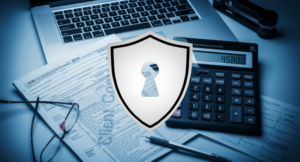
Tax season is a goldmine for cybercriminals. With an influx of sensitive financial data being processed, CPA firms become prime targets for phishing scams, ransomware attacks, and data breaches. Hackers know that accountants are handling Social Security numbers, banking details, and tax return information—making firms a lucrative entry point for identity theft and financial fraud.
Understanding the cybersecurity risks for CPA firms during this critical time is essential to safeguarding client data and maintaining trust. Here’s what firms need to watch for and how they can stay protected.
Common Cybersecurity Threats Facing CPA Firms
Hackers ramp up their efforts during tax season, employing various tactics to breach security defenses. The most common threats include:
- Phishing Attacks – Cybercriminals impersonate banks, government agencies, or even clients to trick accountants into revealing login credentials or downloading malicious files. These emails often contain urgent messages about “unauthorized transactions” or “IRS notices.”
- Ransomware Attacks – CPA firms are a prime target for ransomware, where hackers encrypt files and demand payment for their release. Without secure backups, firms risk losing access to client data indefinitely.
- Business Email Compromise (BEC) – Attackers gain access to email accounts and impersonate firm leaders or clients to redirect payments or request sensitive information.
- Data Breaches – Weak passwords, outdated software, and lack of encryption leave firms vulnerable to breaches, exposing confidential financial records and putting compliance at risk.
- Third-Party Vulnerabilities – Cloud-based tax software and client portals are essential for efficiency, but if not properly secured, they can serve as an entry point for cybercriminals.
How CPA Firms Can Reduce Cybersecurity Risks
Taking a proactive approach to cybersecurity is the best way to prevent attacks. Here’s how CPA firms can safeguard client data during tax season:
✅ Implement Multi-Factor Authentication (MFA) – Enforce MFA for all email accounts, client portals, and tax software to add an extra layer of security beyond passwords.
✅ Train Employees to Recognize Phishing – Regular security awareness training helps staff identify and avoid phishing emails and fraudulent requests.
✅ Secure Data with Encryption – Encrypt sensitive client data at rest and in transit to prevent unauthorized access in case of a breach.
✅ Regularly Back Up Critical Data – Maintain automated, encrypted backups both onsite and in the cloud to protect against ransomware attacks and accidental data loss.
✅ Keep Software & Systems Updated – Cybercriminals exploit vulnerabilities in outdated software. Ensure all tax software, accounting platforms, and security tools are regularly patched.
✅ Monitor Network Activity – Implement continuous network monitoring to detect suspicious activity before it escalates into a full-blown attack.
✅ Restrict Access to Sensitive Information – Follow the principle of least privilege (PoLP), ensuring employees only have access to the data necessary for their roles.
GreenBean IT: Your Trusted IT Partner for CPA Firms
Tax season is stressful enough without the added threat of cyberattacks. GreenBean IT specializes in managed IT services and cybersecurity solutions tailored for CPA firms. From SOC 2 compliance and data encryption to employee security training and 24/7 monitoring, we help firms stay secure year-round.
Don’t let cyber threats derail your tax season. Contact GreenBean IT today to learn how we can protect your firm from cybersecurity risks.
